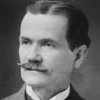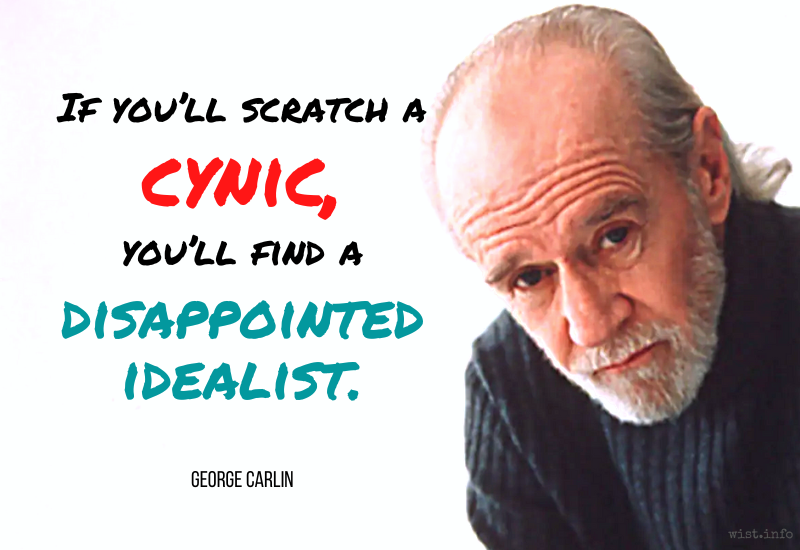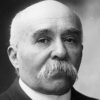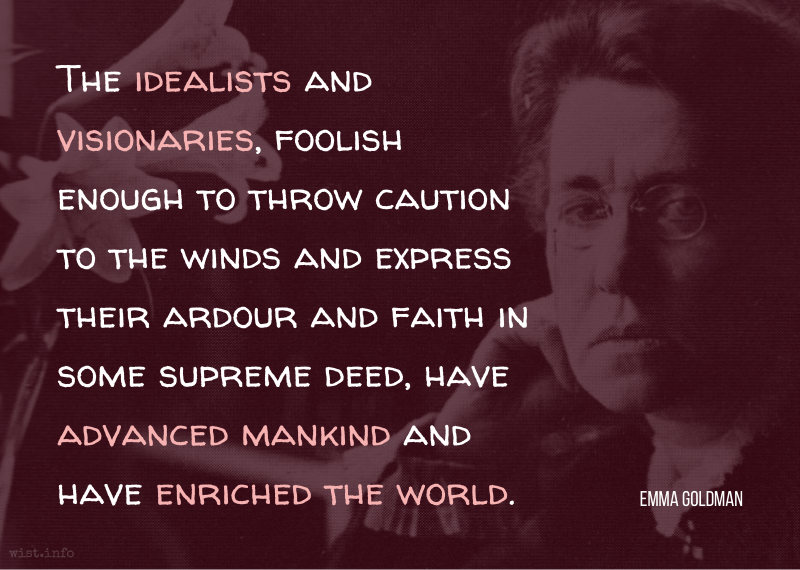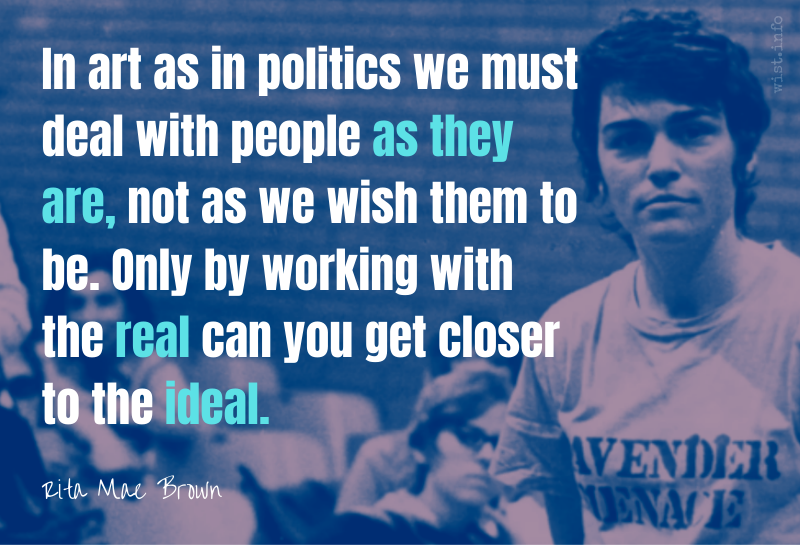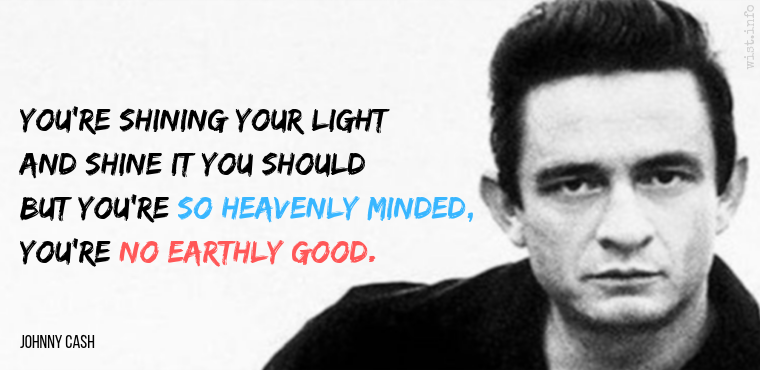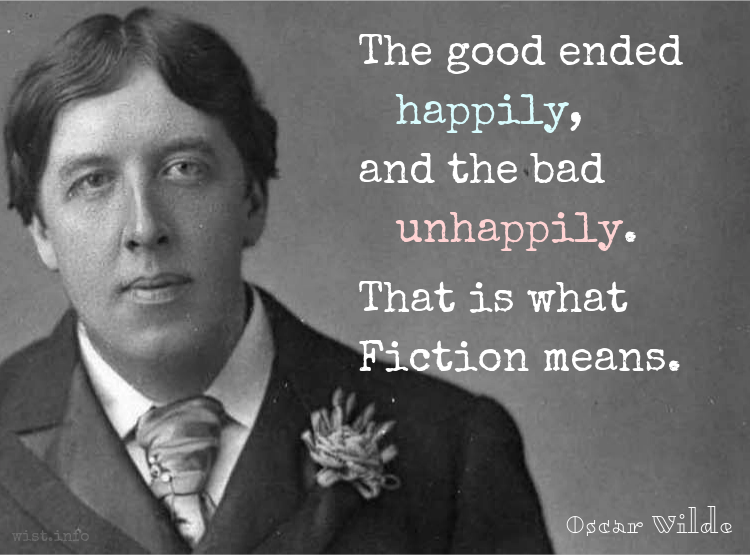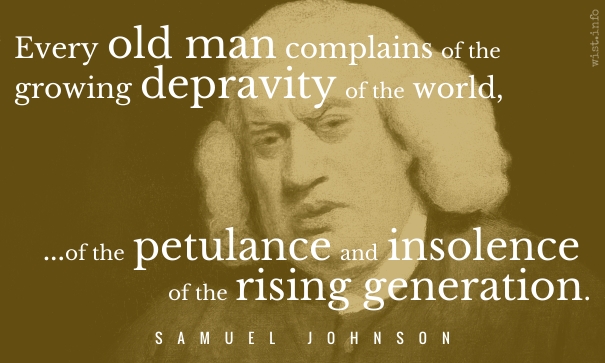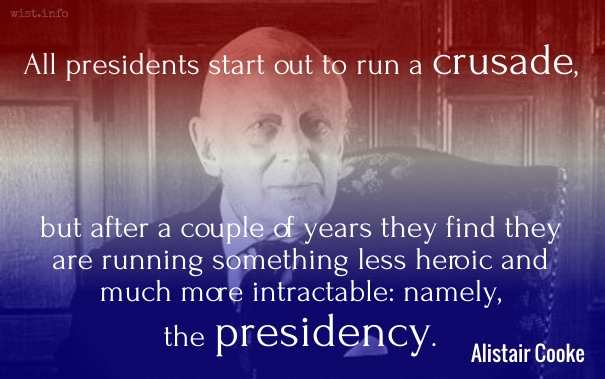If you keep your eyes so fixed on Heaven that you never look at the Earth, you will stumble into Hell.
Austin O'Malley (1858-1932) American ophthalmologist, professor of literature, aphorist
Keystones of Thought (1914)
(Source)
Quotations about:
idealism
Note not all quotations have been tagged, so Search may find additional quotes on this topic.
Art is born and takes hold wherever there is a timeless and insatiable longing for the spiritual, for the ideal: that longing which draws people to art. Modern art has taken the wrong turn in abandoning the search for the meaning of existence in order to affirm the value of the individual for his own sake.
Andrei Tarkovsky (1932-1986) Russian film director, screenwriter, film theorist [Андрей Арсеньевич Тарковский]
Sculpting in Time (1986) [tr. Hunter-Blair]
(Source)
I questioned the desire to attribute the worst aspects of human behaviour to characters whose only useful function, as I see it, aside from simply entertaining young people and anyone else who fancies an uplifting holiday in a storybook world far from the grinding monotony of pessimism and disillusion, is to provide a primary-coloured cartoon taste of how we all might be if we had the wit and the will and the self-sacrifice it takes to privilege our best selves and loftiest aspirations over our base instincts. While that great day is unlikely to happen any time soon in any halfway-familiar real world, why not let comic book universes be playgrounds for the kind of utopian impulses that have in the past brought out the best in us?
Grant Morrison (b. 1960) Scottish comic book writer and playwright
“SUPERMAN and THE AUTHORITY annotations Pt 2,” blog entry (16 Feb 2022)
(Source)
If you’ll scratch a cynic, you’ll find a disappointed idealist.
George Carlin (1937-2008) American comedian
Interview by Marc Cooper, The Progressive (Jul 2001)
(Source)
A documented case of a phrase Carlin frequently used, though not original with him. Often quoted as "Inside every cynical person, there is a disappointed idealist."
Scratch the surface of most cynics and you find a frustrated idealist — someone who made the mistake of converting his ideals into expectations.
Peter Senge (b. 1947) American systems scientist, lecturer, academic
The Fifth Discipline, Part 3, ch. 8 (1990)
(Source)
The uncommitted life is not worth living. We either believe in something or we don’t. Commitment is willingness to stand up and be counted. It is a human must — for young and old, for black and white, for Christian, Moslem and Buddhist. It is skill plus good will. It is a thoughtful decision on the part of an individual to participate passionately in the events of his time. It is the dogged staying-power coupled with the sensible idealism that makes the word go ’round.
The young know how old age should be; the old how youth should have been.
Paul Eldridge (1888-1982) American educator, novelist, poet
Maxims for a Modern Man, #139 (1965)
(Source)
Monsieur, my son is twenty-two years old. If he had not become a Communist at twenty-two, I would have disowned him. If he is still a Communist at thirty, I will do it then.
Georges Clemenceau (1841–1929) French statesman, physician, journalist
(Attributed)
Response to someone who was alarmed about his son being a Communist, as attributed in Bennett Cerf, Try and Stop Me (1944).
This may be the source of the quote also attributed to Clemenceau, “Any man who is not a socialist at age twenty has no heart. Any man who is still a socialist at age forty has no head.” Later, George Seldes attributed to David Lloyd George: "A young man who isn’t a socialist hasn’t got a heart; an old man who is a socialist hasn’t got a head.” François Guizot in the mid-19th Century was said to have said, “Not to be a republican at twenty is proof of want of heart; to be one at thirty is proof of want of head.”
The earliest version of this comes from a public letter by Anselme Polycarpe Batbie (1828-1887), who attributed this to Edmund Burke: "Anyone who is not a republican at twenty casts doubt on the generosity of his soul; but he who, after thirty years, perseveres, casts doubt on the soundness of his mind. [Celui qui n’est pas républicain à vingt ans fait douter de la générosité de son âme; mais celui qui, après trente ans, persévère, fait douter de la rectitude de son esprit.]" This has not been found in Burke's writings.
Variants have also been attributed to Benjamin Disraeli, Dean Inge, George Bernard Shaw, Winston Churchill, Otto von Bismarck, and Bertrand Russell.
Further discussion of this quotation:
From time immemorial the wise and practical have denounced every heroic spirit. Yet it has not been they who have influenced our lives. The idealists and visionaries, foolish enough to throw caution to the winds and express their ardour and faith in some supreme deed, have advanced mankind and have enriched the world.
Emma Goldman (1869-1940) Lithuanian-American anarchist, activist
Living My Life, Part 2, ch. 39 (1931)
(Source)
The greatest bloodshed? The most murders? I would say two things: sincere love and a sincere devotion to liberty. … If you kill out of love or for the perfect utopia, you never stop killing because human nature is always imperfect.
Peter Viereck (1916-2006) American poet, historian, academic
“Clio is No Cleo: The Messiness of History,” lecture, Mt. Holyoke College (1997)
(Source)
Reprinted in Society (Mar 2004) and collected in Strict Wildness (2008).
“People aren’t either wicked or noble,” the hook-handed man said. “They’re like chef salads, with good things and bad things chopped and mixed together in a vinaigrette of confusion and conflict.”
I have no more faith in positive militant ideals; they can so seldom be carried out without thousands of human beings getting maimed or imprisoned. Phrases like “I will purge this nation,” “I will clean up this city,” terrify and disgust me. They might not have mattered so much when the world was emptier: they are horrifying now, when one nation is mixed up with another, when one city cannot be organically separated from its neighbours.
E. M. Forster (1879-1970) English novelist, essayist, critic, librettist [Edward Morgan Forster]
“The Unsung Virtue of Tolerance,” radio broadcast (Jul 1941)
(Source)
Published as "Tolerance," Two Cheers for Democracy (1951).
In art as in politics we must deal with people as they are, not as we wish them to be. Only by working with the real can you get closer to the ideal.
Rita Mae Brown (b. 1944) American author, playwright
In Her Day, Preface, “A Note to the Feminist Reader” (1976)
(Source)
The people I respect most behave as if they were immortal and as if society was eternal. Both assumptions are false: both of them must be accepted as true if we are to go on eating and working and loving, and are to keep open a few breathing-holes for the human spirit. No millennium seems likely to descend upon humanity; no better and stronger League of Nations will be instituted; no form of Christianity and no alternative to Christianity will bring peace to the world or integrity to the individual; no “change of heart” will occur. And yet we need not despair, indeed, we cannot despair; the evidence of history shows us that men have always insisted on behaving creatively under the shadow of the sword; that they have done their artistic and scientific and domestic stuff for the sake of doing it, and that we had better follow their example under the shadow of the aeroplanes.
E. M. Forster (1879-1970) English novelist, essayist, critic, librettist [Edward Morgan Forster]
“What I Believe,” The Nation (16 Jul 1938)
(Source)
Come heed me, my brothers, come heed, one and all
Don’t brag about standing or you’ll surely fall
You’re shining your light and shine it you should
But you’re so heavenly minded, you’re no earthly goodIf you’re holding heaven, then spread it around
There’s hungry hands reaching up here from the ground
Move over and share the high ground where you stood
So heavenly minded, you’re no earthly goodJohn R. "Johnny" Cash (1932-2003) American singer-songwriter, guitarist, actor, author
“So Heavenly Minded, You’re No Earthly Good”
(Source)
The good ended happily, and the bad unhappily. That is what Fiction means.
Oscar Wilde (1854-1900) Irish poet, wit, dramatist
The Importance of Being Earnest, act 2 (Miss Prism) [1895]
(Source)
Cynics are, in the end, only idealists with awkwardly high standards.
The process which, if not checked, will abolish Man goes on apace among Communists and Democrats no less than among Fascists. The methods may (at first) differ in brutality. But many a mild-eyed scientist in pince-nez, many a popular dramatist, many an amateur philosopher in our midst, means in the long run just the same as the Nazi rulers of Germany: ‘Traditional values are to be debunked’ and mankind to be cut out into some fresh shape at the will (which must, by hypothesis, be an arbitrary will) of some few lucky people in one lucky generation which has learned how to do it.
DRUMLIN: I know you must think this is all very unfair. Maybe that’s an understatement. What you don’t know is I agree. I wish the world was a place where fair was the bottom line, where the kind of idealism you showed at the hearing was rewarded, not taken advantage of. Unfortunately, we don’t live in that world.
ARROWAY: Funny, I’ve always believed that the world is what we make of it.
Carl Sagan (1934-1996) American scientist and writer
Contact, novel (1997) [film screenplay by J. Hart and M. Goldenberg]
(Source)
Every old man complains of the growing depravity of the world, of the petulance and insolence of the rising generation. He recounts the decency and regularity of former times, and celebrates the discipline and sobriety of the age in which his youth was passed; a happy age which is now no more to be expected, since confusion has broken in upon the world, and thrown down all the boundaries of civility and reverence.
Samuel Johnson (1709-1784) English writer, lexicographer, critic
The Rambler, #50 (8 Sep 1750)
(Source)
No member of our generation who wasn’t a Communist or a dropout in the thirties is worth a damn.
Lyndon B. Johnson (1908-1973) American politician, educator, US President (1963-69)
Comment about wealthy campaign donors (1960)
(Source)
Comment made to friends and reporters while flying back from a campaign event in Binghamton, New York. Quoted in David Halberstam, The Best and the Brightest, ch. 20 (1972)
It is this belief in absolutes, I would hazard, that is the great enemy today of the life of the mind. This may seem a rash proposition. The fashion of the time is to denounce relativism as the root of all evil. But history suggests that the damage done to humanity by the relativist is far less than the damage done by the absolutist — by the fellow who, as Mr. Dooley once put it, “does what he thinks th’ Lord wud do if He only knew th’ facts in th’ case.”
Courage charms us becaue it indicates that a man loves an idea better than all the things in the world, that he is thinking neither of his bed, nor his dinner, nor hismoney, but will venture all to put in act the invisible thought of his mind.
The extremes of vice and virtue are alike detestable; absolute virtue is as sure to kill a man as absolute vice is, let alone the dullnesses of it and the pomposities of it.
Samuel Butler (1835-1902) English novelist, satirist, scholar
The Note-Books of Samuel Butler, “Vice and Virtue,” ii (1912)
Full text.
Aim at perfection in everything, though in most things it is unattainable; however, they who aim at it, and persevere, will come much nearer it than those whose laziness and despondency make them give it up as unattainable.
Lord Chesterfield (1694-1773) English statesman, wit [Philip Dormer Stanhope]
Letter to his son, #226 (24 May 1750)
(Source)

